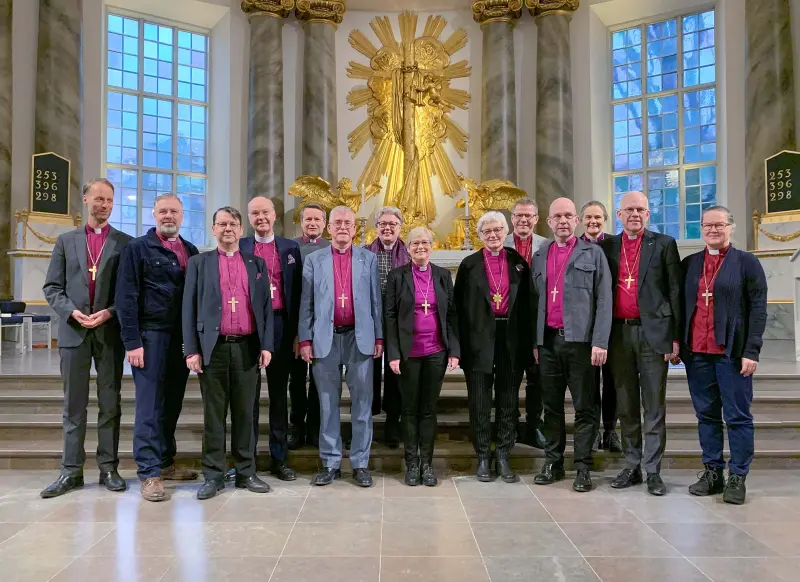We are facing a climate emergency. We know that human activity is the main cause, and we know what needs to be done.2 We have an international commitment, the Paris Agreement, we have a national climate law, and we have the resources.
Do we also have the will, the strength, and the hope? No one is saying it’s easy, but there is no alternative. The next ten years will be one of the most crucial decades for humanity. It is now, in the 2020s, that change must occur.
Tackling the climate crisis requires mental composure and action. In A Bishops’ Letter about the Climate, we write about the Church of Sweden’s goal to be climate neutral by 2030, 15 years ahead of the corresponding target for the whole of Swedish society.3 The Bishops’ Conference also backs the call for ecocide to be an internationally recognised crime under the Rome Statute of the International Criminal Court.4
Progress in the field of climate-smart technology gives us reason for cautious confidence but not for unbridled optimism. The latest UN report shows that our current efforts will not enable us to achieve the 1.5-degree target.5 Sweden’s high ambitions to be a leader in climate transition are not being sufficiently translated into action.6 We now need a rapid transition based on science and technology and characterised by collaboration, equality, and justice.7
The massive mobilisation and adjustment that the world achieved during the pandemic showed that change is possible. The past year has also reminded us that no one can be safe until everyone is safe; we are dependent on each other. The unequal distribution of vaccines shows how difficult it is to achieve global justice. However, the climate emergency requires a clear equality perspective. Those hit hardest must be able to influence the solutions. We all live on the same planet under the same sky with increasing greenhouse gases and rising sea levels.
The climate crisis is existential and spiritual because it concerns the fundamental conditions for human life in the profoundest sense. We need to tackle the worry, the guilt and the questions raised by the emergency. Have we abandoned our responsibilities and left our children and grandchildren to foot the bill? How can we create a fair transition? What dare we hope for?
We do not own the planet, we are merely its stewards for a short time: “The earth is the Lord’s and all that is in it” (Psalm 24:1). As with people from all major religious traditions, our faith calls us to take responsibility for creation.8 Like other church leaders, we pray for our decision-makers gathered in Glasgow, that they will have the courage and strength to make strong decisions that benefit our planet and all who live here, now and in the future: “Choose life so that you and your descendants may live” (Deuteronomy 30:19).9
The climate transition requires us to change things and change ourselves. We need to rethink – to repent. Instead of a lifestyle that depletes the planet, we must live our lives within the planet’s limits. It is a path that requires perseverance, but it can lead us to the future we have not yet seen: to a better and more sustainable society.
The issue of climate justice is rooted in a biblical idea. Jesus reminds us that a person who has much also has great responsibility (Luke 12:48). The countries that have contributed most to climate change and those that have resources should take the greatest responsibility for reducing emissions and financing climate adaptation.
We now need the courage, confidence, and strength to resist resignation and make the necessary changes. Christian faith offers a basis for both hope and the ability to act. Also in times of crisis. We have all been created by God and have a responsibility to protect and take care of the earth. It’s crunch time!
1 https://www.stockholmresilience.org/research/planetary-boundaries/the-nine-planetary-boundaries.html
2 https://www.ipcc.ch/assessment-report/ar6/
3 https://www.svenskakyrkan.se/klimatbrevet
4 Ecocide is defined as “unlawful or wanton acts committed with knowledge that there is a substantial likelihood of severe and either widespread or long-term damage to the environment being caused by those acts.” See https://endecocide.se/definition/
5 https://www.ipcc.ch/assessment-report/ar6/
6 https://www.klimatpolitiskaradet.se/wp-content/uploads/2021/04/klimatpolitiskaradetrapport2021.pdf
7 https://www.mrfcj.org/our-work/areas-of-work/human-rights-and-climate-change/
8 https://parliamentofreligions.org/program-areas/climate-action and https://www.rfp.org/priority-sustainable-environment/
9 https://ec-patr.org/a-joint-message-for-the-protection-of-creation2/
Tags: Statement from the Bishops of the Church of Sweden



